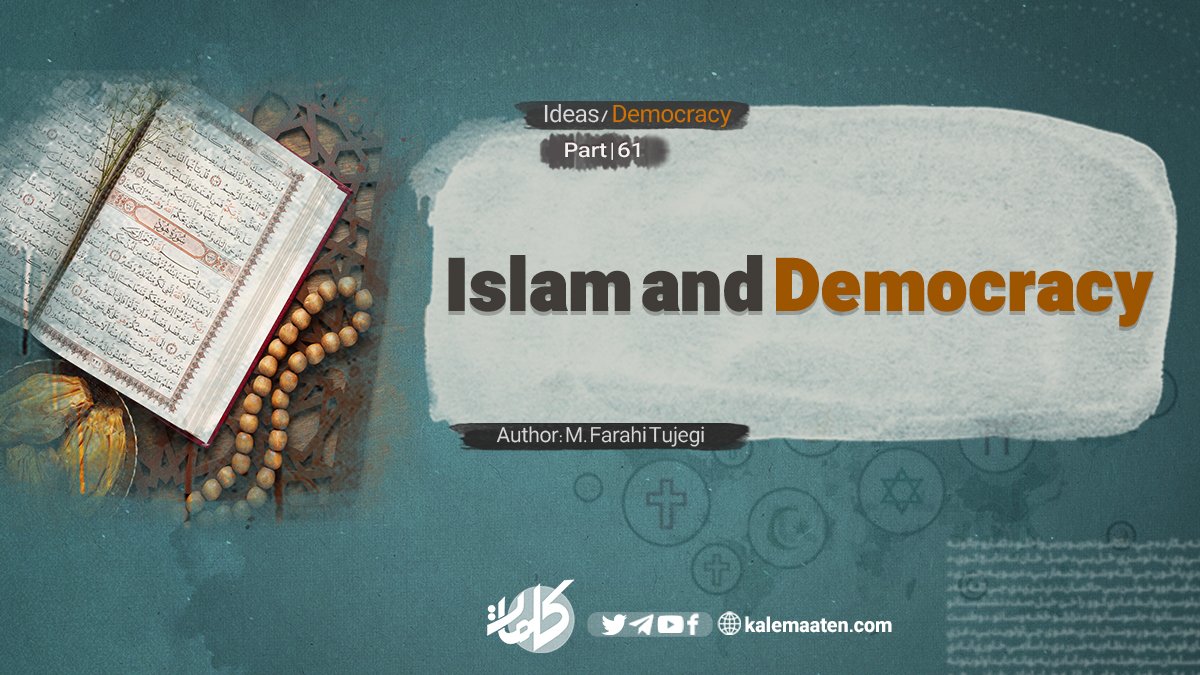Author: M. Farahi Tujegi
Islam and Democracy (Part 61)
The Difference Between Consultation (Shora) in Islam and Democracy:
In previous articles, we discussed how the typical modern democratic system allows for a parliament that represents all citizens. However, this parliamentary form is generally only feasible for very small countries. To address this limitation, democracy has shifted from its original framework to adopt a representative parliamentary system as its resolution. Without a parliament, democracy loses much of its meaning and appears rigid, confined to specific frameworks. Despite evidence that this system is inadequate for the fast-paced modern era, its removal from the political landscape seems impossible.
In Islam, consultation (Shora) is also a fundamental principle that remains relevant across all contexts. This principle is implemented in various feasible ways. The fundamental differences between consultation in Islam and democracy can be summarized as follows:
1. Decision-Making in Military Matters: In Islam, military decisions are made through consultation with advisors, but the final decision rests with the commander. In contrast, democracy relies on the majority vote, a method generally not accepted in military practice.
2. Limitations in Religious Matters: In Islam, consultation does not apply to issues with clear religious rulings (mansus), meaning no consultation is needed when a religious ruling is explicit. In democracy, however, no such restrictions exist, allowing parliaments to make decisions that may contradict clear religious rulings.
3. Qualifications of Council Members: In Islam, members of the consultative council must meet specific conditions and possess particular qualifications, as previously explained. However, in a democracy, any individual elected by the people becomes a council member, regardless of their beliefs or qualifications.
4. Consultation with Specialists: In Islam, consultation must involve specialists in the relevant field to achieve sound decisions. This requirement lacks the same precision and scope in democracy.
5. Dismissal of Council Members: The process for dismissing council members in Islam follows specific principles and guidelines, while in democracy, the conditions differ.
6. Judicial Immunity of Council Members: In Islam, council members do not enjoy special immunity and must abide by religious laws, being held accountable for violations. In democracy, parliamentary members may enjoy immunity in certain circumstances.
The Islamic consultative system is grounded in principles recognized by Islamic law, whereas democracy relies on public elections for legitimacy, even when elected individuals lack religious qualifications. In a democratic system, a person’s religion or faith is not a prerequisite for election, while in Islam, consultation is limited to qualified individuals (Ahl al-Hall wa al- ‘Aqd) and the community’s elite—those with knowledge, expertise, and a deep understanding of religious teachings, as well as specialists in various fields.
Is Consultation (Shora) Binding or Advisory?
There is a difference of opinion regarding whether consultation is obligatory or merely recommended. Some scholars consider it obligatory, while others regard it as advisable. There is also debate on whether the consultation’s outcome is binding. Some believe the majority vote must be followed by the ruler, meaning that once the majority opinion is determined, the leader cannot revert to their own decision or that of the minority. This view interprets “Shora is binding” accordingly.
Others argue that consultation serves an advisory role, clarifying matters for the decision-maker by presenting different perspectives on a given issue. Ultimately, the leader makes the final decision based on these consultations, and according to this group of scholars, the leader is not obligated to follow the majority’s opinion.
This topic has been discussed in detail elsewhere; due to the need for brevity, it will be summarized here.
Scholars’ Views on the Binding Nature of Consultation
1. The First Opinion: Consultation is Binding
Some scholars believe the ruler is obligated to follow the council’s decision. The primary evidence for this view is the following Quranic verse: “فَإِذَا عَزَمْتَ فَتَوَكَّلْ عَلَى اللَّهِ إِنَّ اللَّهَ يُحِبُّ الْمُتَوَكِّلِينَ” Translation: “Then when you have taken a decision (after consultation), put your trust in Allah. Indeed, Allah loves those who rely upon Him.” (Quran 3:159)
Commentators (Mufasireen) interpret this verse as evidence for the necessity of acting upon consultation, understanding the word “Azm” (determination) as following the majority opinion. Ibn Mardawayh narrates from Ali (RA) that when the Prophet (PBUH) was asked about the meaning of “Azm,” he replied: “It means consulting the knowledgeable and following their opinion.” Similarly, Khalid bin Ma‘dan and Abdul Rahman bin Abi Husayn narrate that when a man asked the Prophet (PBUH) about the meaning of “Azm,” he responded: “Azm means consulting a person of sound judgment and acting according to their view.” Other supporting evidence exists but is omitted for brevity.
2. The Second Opinion: Consultation is Not Binding
Another group of scholars believes the ruler is not obligated to follow the council’s decision and that it remains optional. Their argument is also based on the above Quranic verse. Qatadah interprets it as Allah commanding His Prophet to rely only on Him after making a decision, not on the consultation of others.
This view is supported by historical events from the time of the Prophet (PBUH) and the Rightly Guided Caliphs, where decision-makers acted contrary to the council’s opinion when deemed necessary. Examples include:
– The Treaty of Hudaybiyyah: The Prophet (PBUH) made a decision that some Sahaba disagreed with.
– The War Against Apostates: Caliph Abu Bakr (RA) proceeded with military action despite opposition from some Companions.
– The Deployment of Usama’s Army: The Prophet (PBUH) sent Usama’s army despite objections.
– Decisions of Umar (RA): Such as redistributing governors’ wealth between themselves and the treasury.
– Decisions of Usman (RA): He dealt leniently with rumormongers, contrary to council advice.
– Decisions of Ali (RA): Early in his caliphate, he dismissed governors against some Sahaba’ opinions.
The Preferred View
Among these opinions, it seems appropriate to differentiate between various matters:
1. Religious Matters: A ruler must act according to scholars’ counsel on religious issues.
2. Ijtihadi (Interpretive) Matters: In such cases, the ruler may choose to follow the council’s decision or rely on their judgment.
3. Technical Matters: In specialized fields such as medicine, engineering, or crisis management, consulting experts is obligatory, especially regarding the nation’s survival and security.
Al-Damiji holds a similar view. However, many contemporary scholars believe consultation should be binding for the ruler in all cases.
Continues…
[1] Aal-e Imran: 159.
[2] Ibn Kathir, vol. 1, p. 327.
[3] Qurtubi, vol. 4, p. 257.



